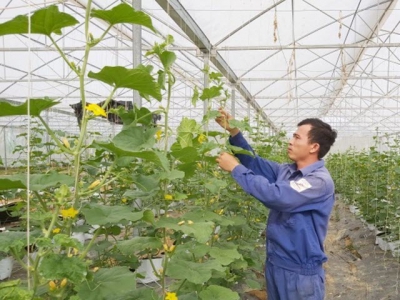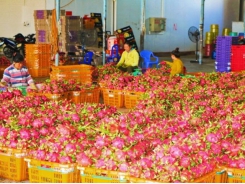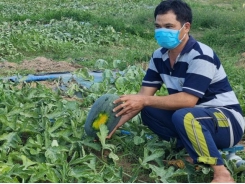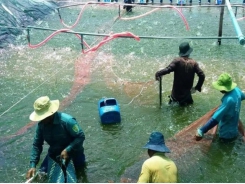Nghe An province posts the highest agriculture growth in the north-central region in 2021

The central province of Nghe An achieved a growth of 5.59 per cent in the agriculture sector this year despite many difficulties.
Nghe An province achieved GRDP growth of 5.59 per cent, maintaining stable life for nearly 84.5 per cent of the rural population. Photo: Viet Khanh.
Director of Nghe An Province’s Department of Agriculture and Rural Development, Nguyen Van De said that complicated weather conditions, diseases on animals and crops left huge negative impacts on the province’s agriculture production in 2021.
“Faced with difficulties and challenges particularly the COVID-19 pandemic, thanks to the close attention and direction of the Central Committee, the Ministry of Agriculture and Rural Development, the Provincial Party Committee, the People's Council, the Provincial People's Committee, the efforts of millions of farmers, Nghe An’s agricultural sector overcame difficulties and achieved many positive results, ” said De.
Vo Thi Nhung, Deputy Director of the department said that the province’s agriculture sector completed all planned targets, typically the winter-spring crop 2020-2021 and the summer-autumn crop 2021 were both bumper crops.
Agriculture production of the province this year reached
about VND38.212 trillion, the growth rate of the total agricultural, forestry and fishery products (GRDP) reached 5.59 per cent while Vietnam’s agriculture sector saw a growth of 2.94 per cent.
Its agricultural structure continued to shift in a positive direction. By the end of 2021 agriculture production accounts for 77.52 per cent, forestry 6.17 per cent and fishery 16.31 per cent. The proportion of livestock in agriculture is estimated at 47.94 per cent.
Nghe An agricultural industry continues to strongly change the structure of crops, livestock and seasons. Plant protection and veterinary work are ensured regularly and continuously. Productivity, quality and economic efficiency have changed noticeably.
In terms of food production, the total cultivation area for the whole year is estimated at 224,568 ha. Rice is still the main crop, although the rice area is reduced. The rice quality has increased as the average yield is 58.07 quintals/ha and output is estimated at 1,039,162 tons.
The structure of rice varieties has shifted in the direction of gradually reducing hybrid rice, instead, people actively cultivate quality seeds such as AC5, QJ1, DT52, BTE1, NA6 materials, sticky rice, herbal rice which ensure profits and are easy to consume in the market.
Veterinary work were given much attention as Nghe An saw hundreds of outbreaks of African swine fever this year. Photo: Viet Khanh.
For livestock and veterinary work, the Department of Agriculture and Rural Development focused on directing and thoroughly implementing preventive measures, thereby promptly controlling and minimizing damage.
Since the beginning of the year, the province has recorded 525 outbreaks of African swine fever in 21 districts, cities and towns. More than 35,530 pigs were destroyed due to the disease.
In the forestry sector, Nghe An made a big breakthrough when focusing on developing and improving the quality of raw material areas, applying high technology, investing in deep processing, raising the value of wood products and non-timber forestry products.
The province's timber output increased sharply, the afforestation of raw materials has changed rapidly to large timber production and business, and afforestation with indigenous trees. In particular, in 2021, the locality has had many investment promotion activities including the operation of a high-tech applied forestry park and the establishment of a wood association.
Regarding the National Target Program to build new rural areas, despite facing a great disadvantage in resource allocation during the transition period, Nghe An s drastically changed the structures of crops and livestock, developed production models towards increasing added value.
In addition, vocational training for rural workers has also been paid close attention to. Craft villages have been formed and expanded, which has significantly solved the job needs of thousands of people, especially those returning home due to the Covid-19 pandemic.
It is expected that by the end of 2021, 20 communes in the province meet new rural area standards, 24 communes meet advanced rural development standards, 2 communes will be recognised as a model for new rural areas, one district (Quynh Luu) meets the standards of rural areas; cumulatively, 300/411 communes have certificated as new rural areas.
Further efforts
Hoang Nghia Hieu, Vice Chairman of the Provincial People's Committee spoke at the meeting on reviewing the agriculture performance that the year 2021 was the first year to implement the Resolution of the 19th Nghe An Provincial Party Congress, the socio-economic development plan period 2021-2025.
In addition to the favourable factors, the implementation process faced many difficulties due to the extreme changes in the weather and serious impacts of the Covid-19 pandemic.
He said that provinces and cities across the country achieved low growth, even negative growth, but Nghe An has successfully implemented the "dual goals" as prioritizing resources for epidemic prevention and control as well as socio-economic development.
“Nghe An is one of the few localities with economic growth above 6 per cent with budget revenue reaching VND 17.678 trillion,” he said.
“The agricultural sector is considered a bright spot with GRDP growth of 5.59 per cent, maintaining stable life for nearly 84.5 per cent of the rural population, especially creating jobs for tens of thousands people who had to return to their hometown due to the impact of the Covid-19 pandemic,” he said.
“Reality is posing intertwined opportunities and challenges,” he said, calling for further efforts and determination in every hour, minute, and second of the entire agriculture and rural development sector, relevant stakeholders and farmers.
Có thể bạn quan tâm
Phần mềm

Phối trộn thức ăn chăn nuôi

Pha dung dịch thủy canh

Định mức cho tôm ăn

Phối trộn phân bón NPK

Xác định tỷ lệ tôm sống

Chuyển đổi đơn vị phân bón

Xác định công suất sục khí

Chuyển đổi đơn vị tôm

Tính diện tích nhà kính

Tính thể tích ao hồ



 Microbial preparation enables farmers to make organic fertilizer…
Microbial preparation enables farmers to make organic fertilizer…  Agricultural sector’s growth of Bac Lieu ranks first…
Agricultural sector’s growth of Bac Lieu ranks first…